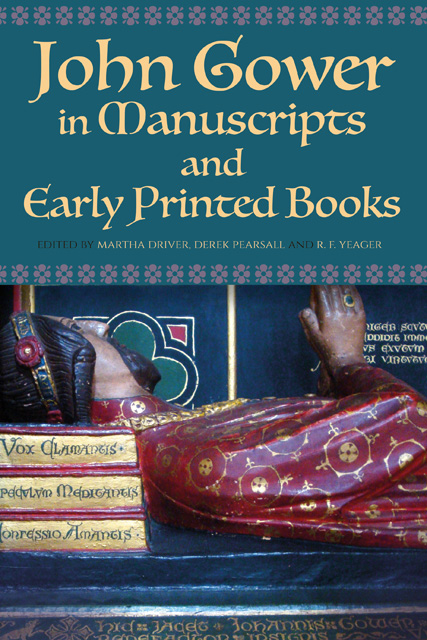13 - In Praise of European Peace: Gower’s Verse Epistle in Thynne’s 1532 Edition of Chaucer’s Workes
Published online by Cambridge University Press: 18 January 2023
Summary
Floruit Gouerus regnante in Anglia Richardo secundo, cui libros suos dedicauit, et cui de laude pacis cantionem, plenissimam consilii et uirtutis, etiam caecus obtulit. Vixit ad iustam usque senectutem, ut ex eius uersibus quos subscribam apparet.
Dum potui scripsi, sed nunc quia curua senectus
Turbauit sensus, scripta relinquo scholis.
[Gower flourished during the reign of Richard II, to whom he dedicated his books; even when he had become blind he offered him his poem “In Praise of Peace,” full of good counsel and virtue. He lived to a ripe old age, as is evident from his lines quoted here:
I wrote while I could, but now that stooped old age Has muddled my senses, I leave writing to schools.]
This description of Gower’s poetic achievement is taken from John Leland’s De uiris illustribus, an unfinished bio-bibliography of British authors, written, according to its recent editor, James Carley, in two distinct phases, one before the dissolution of the monasteries, and one afterwards in the mid-1540s. Although Leland’s aim in this work was to rediscover a native tradition of Latin eloquence, dating back to Roman Britain and culminating in English humanists of his own time, he devoted one chapter each to Gower and Chaucer to celebrate their accomplishments in refining the English language. Leland’s account of Gower’s poetic career, composed in 1535 or 1536, begins by describing his youth spent in the pursuit of humaniores literae and his fondness for Ovid as a model of Latin poetic style. Leland regards Gower’s imitation of Ovid in his Latin verses as “studious” rather than “felicitous,” but this is hardly surprising, Leland says, in view of the “semi-barbarous age” (semibarbaro saeculo) in which the poet lived. According to Leland, even in the present age of cultural efflorescence the “exuberant fruitfulness” (redundantem felicitatem) of Ovid’s poetry can only be fittingly expressed by the likes of Giovanni Pontano, a distinguished humanist poet of Quattrocento Italy, whom Leland extols as equal to – or even surpassing – Catullus in one of the Latin encomia he wrote in the mid-to-late 1520s. Having thus briefly remarked upon Gower’s ambitious if not wholly successful attempts at Ovidian imitation, Leland goes on to praise him as the first to polish the native tongue, which was, before his time, “uncultivated and almost completely unformed” (inculta et fere tota rudis).
- Type
- Chapter
- Information
- John Gower in Manuscripts and Early Printed Books , pp. 231 - 246Publisher: Boydell & BrewerPrint publication year: 2020



